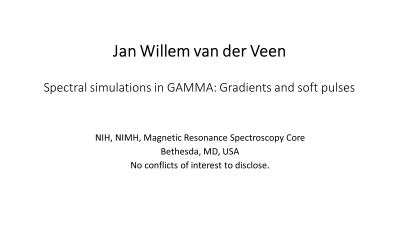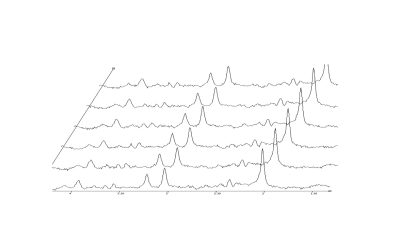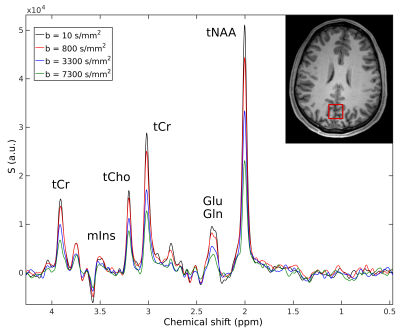|
Weekend Educational Course
Advanced Spectroscopy |
|
Advanced Spectroscopy: Part 1
Weekend Course
ORGANIZERS: Anke Henning, Roland Kreis
Sunday, 17 June 2018
| S02 |
08:00 - 09:15 |
Moderators: Anke Henning, Roland Kreis |
Skill Level: Advanced
Session Number: WE-18A
Overview
This course will present hot topics in advanced MR spectroscopy, including technical methods, issues and pitfalls, and research applications.
Target Audience
Researchers and clinical users of spectroscopy trying to go beyond standard clinical MRS.
Educational Objectives
As a result of attending this course, participants should be able to:
-Describe critical issues in MR spectroscopy methods;
-List current clinical and research applications of MR spectroscopy; and
-Summarize different advanced MRS methods.
08:00
|
|
 UHF MRSI: SNR, Speed & Resolution UHF MRSI: SNR, Speed & Resolution
Michal Považan
The temporal and spatial resolution of an MR experiment is always influenced by the available signal-to-noise ratio (SNR). In general, SNR increases with a higher static magnetic field (B0). Magnetic resonance spectroscopic imaging may benefit from the ultra-high field, however novel approaches are necessary to overcome the technical challenges that arise at such high magnetic field strengths. In this talk we focus on the specifics of UHF MRSI and present the most recent MRSI methods where the SNR gain can be traded off for higher spatial or temporal resolution.
|
08:25
|
|
 Undersampled Spectroscopic Imaging: Benefits & Pitfalls Undersampled Spectroscopic Imaging: Benefits & Pitfalls
Ricardo Otazo
This lecture presents the main techniques to undersample MR spectroscopic imaging (MRSI) for increased imaging speed, including parallel imaging, compressed sensing and model-based subspace reconstruction
|
08:50
|
|
 Spectral Editing: MEGA & Beyond Spectral Editing: MEGA & Beyond
Ovidiu Andronesi
|
09:15
|
|
Break & Meet the Teachers |
|
| |
|
Advanced Spectroscopy: Part 2
Weekend Course
ORGANIZERS: Anke Henning, Roland Kreis
Sunday, 17 June 2018
| S02 |
10:00 - 11:40 |
Moderators: Anke Henning, Roland Kreis |
Skill Level: Advanced
Session Number: WE-18B
Overview
This course will present hot topics in advanced MR spectroscopy, including technical methods, issues and pitfalls, and research applications.
Target Audience
Researchers and clinical users of spectroscopy trying to go beyond standard clinical MRS.
Educational Objectives
As a result of attending this course, participants should be able to:
-Describe critical issues in MR spectroscopy methods;
-List current clinical and research applications of MR spectroscopy; and
-Summarize different advanced MRS methods.
10:00
|
 |
 Spectral Simulations in GAMMA: Gradients & Soft Pulses Spectral Simulations in GAMMA: Gradients & Soft Pulses
Jan Willem van der Veen
Gradients and soft pulses are simulated in GAMMA to correct for technical shortcomings of actual mrs sequences. Simulations are made in a spatial grid to handle chemical shift artifacts, four compartment problem, and the effect of crushers. Described is how to prevent aliasing of the grid with the phase roll of the crushers and how to speed up the calculations. Finally a few practical applications are mentioned to improve quantification of the metabolites.
|
10:25
|
|
 Classification Tools for MRS of Cancer Classification Tools for MRS of Cancer
Sabine Van Huffel
This lecture explains how to extract diagnostic information from the raw MR spectra possibly combined with information from other MR modalities. Starting from basic and advanced concepts in machine learning, the most important classification methods are surveyed. The application of these classifiers in assessing brain tumor heterogeneity is illustrated in a variety of case studies. In-vivo single-voxel MR Spectroscopy (MRS) as well as chemical Shift Imaging are considered, long-echo time as well as short-echo time acquisition schemes. Moreover, it is shown how to combine these measurements with other basic (T1-weighted,T2-weighted) as well as advanced (PWI, DWI, DTI, DKI) MR modalities.
|
10:50
|
 |
 Functional MR Spectroscopy Functional MR Spectroscopy
Paul Mullins
Proton MRS is often thought of as a static measure. In the past 10 years however, this view has been challenged by several studies showing that it is actually sensitive to fluctuations in neurometabiolites as a result of neural activity. This technique of "functional" MRS (fMRS) is not new, having been around since 1991, however with the ready availability of 3T or higher MRI systems, improved acquisition techniques and accurate fitting packages, fMRS has seen renewed interest. A discussion of the main technique, the result that might be expected and experimental considerations for fMRS will be presented using Glutamate as the model neurometabolite. Attendees should come away with a renewed appreciation for the role 1H-fMRS may play in understanding neural activity and function.
|
11:15
|
 |
 Diffusion-weighted MR Spectroscopy Diffusion-weighted MR Spectroscopy
Francesca Branzoli
Diffusion-weighted 1H MR spectroscopy (DW-MRS) provides unique cell-specific and compartment-specific microstructural information based on the diffusion properties of intracellular metabolites in brain tissue. In this talk, the basic aspects of DW-MRS data acquisition and processing will be presented, together with some clinical and preclinical applications.
|
11:15
|
|
Adjournment & Meet the Teachers |
|
| Back |
| The International Society for Magnetic Resonance in Medicine is accredited by the Accreditation Council for Continuing Medical Education to provide continuing medical education for physicians. |




